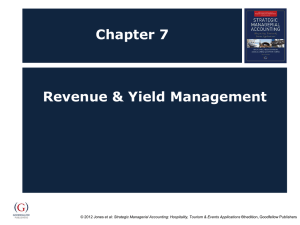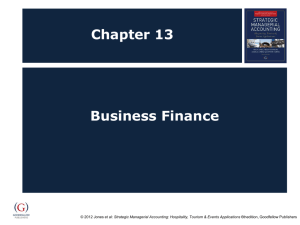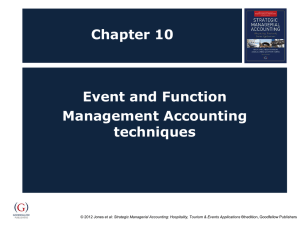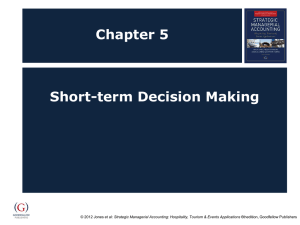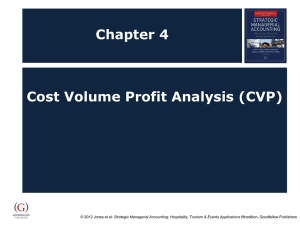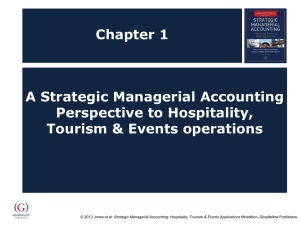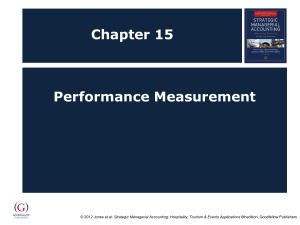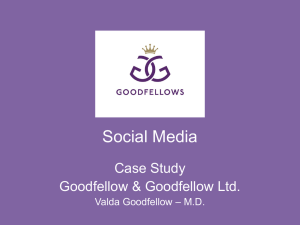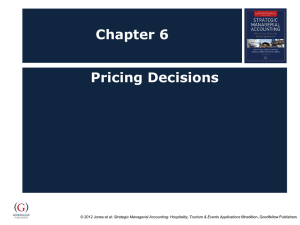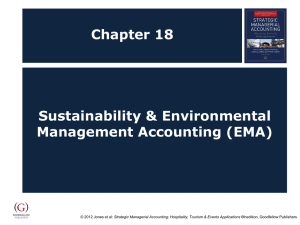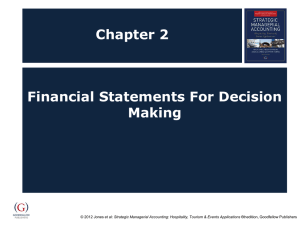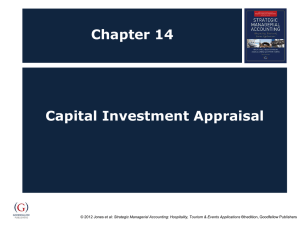Chapter 16 - Goodfellow Publishers
advertisement
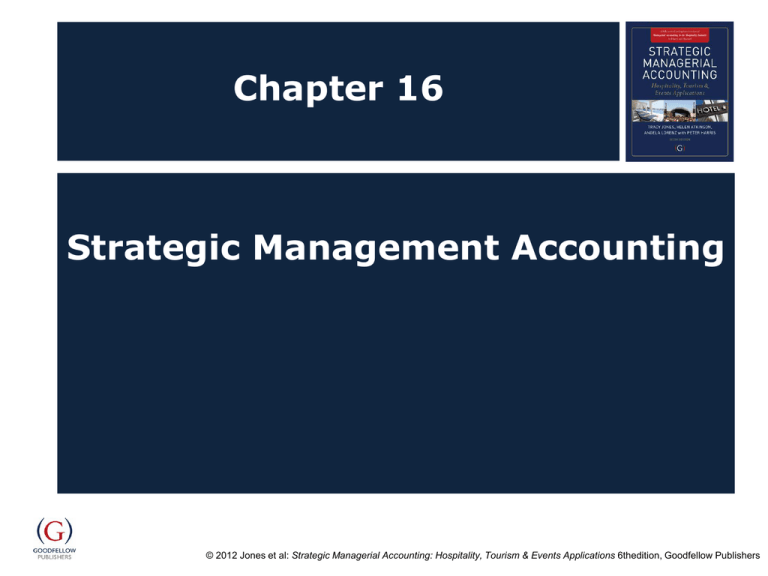
Chapter 16 Strategic Management Accounting © 2012 Jones et al: Strategic Managerial Accounting: Hospitality, Tourism & Events Applications 6thedition, Goodfellow Publishers Objectives After studying this topic you should be able to: Discuss the development and key elements of strategic management accounting Understand the difference between traditional and strategic management accounting Evaluate key analytical tools which link management accounting with strategy © 2012 Jones et al: Strategic Managerial Accounting: Hospitality, Tourism & Events Applications 6thedition, Goodfellow Publishers Strategic Management Accounting (SMA) Definition “a form of management accounting in which emphasis is placed on information which relates to factors external to the firm, as well as nonfinancial information and internally generated information” CIMA official terminology, 2005, p54 © 2012 Jones et al: Strategic Managerial Accounting: Hospitality, Tourism & Events Applications 6thedition, Goodfellow Publishers Conceptions of SMA The first is the attempt to incorporate strategic ideas into management accounting by taking generic strategy tools and looking at what management accounting information can used to support strategy. The second that it is designed to align management accounting with marketing management for strategic positioning. This view looks at the marketing tools used by businesses and uses management accounting within those tools. The third is that it is just a name to group together many of the contemporary approaches in management accounting that have developed which have a strategic implication. There are a number of contemporary approaches to management accounting which have been marked as strategic management accounting techniques because of their external and market orientated content. Roslender and Hart (2010) © 2012 Jones et al: Strategic Managerial Accounting: Hospitality, Tourism & Events Applications 6thedition, Goodfellow Publishers A comparison of the traditional and strategic approaches to management accounting Traditional Approach Strategic Approach Financial Focus Value Focus Absorption costing for Cost allocation Cost control orientation Internally Focussed Performance Measurement financial Fragmented systems Accounting and operational information separate Marginal costing, target costing Customer Value orientation Externally orientation Multi-dimensional performance measurement and benchmarking Integrated Systems ERP and accounting systems integration Profit motives short term Profit motive longer term Pricing short term cost orientated Pricing market driven and strategic © 2012 Jones et al: Strategic Managerial Accounting: Hospitality, Tourism & Events Applications 6thedition, Goodfellow Publishers Boston Matrix © 2012 Jones et al: Strategic Managerial Accounting: Hospitality, Tourism & Events Applications 6thedition, Goodfellow Publishers Value generation Michael Porter (1985) identified two main types of competitive advantage: Cost advantage Differentiation advantage Achieved by provision of a product or service at a lower cost than your rivals Achieved by provision of a product or service which can be distinguished from the competitors and potentially allows a premium price to be charged © 2012 Jones et al: Strategic Managerial Accounting: Hospitality, Tourism & Events Applications 6thedition, Goodfellow Publishers Porter (1985) Value Chain © 2012 Jones et al: Strategic Managerial Accounting: Hospitality, Tourism & Events Applications 6thedition, Goodfellow Publishers Comparison of Value Chain for a Fast food and fine dining restaurant Primary Activities Inbound logistics Fast Food Fine Dining Probably outsources, focus on cost and consistency Typified by local supply, focus on quality and provenance Operations Automation, standard processes Automation, customer processing systematic Bespoke service, artisan values Customisation, service environment critical, ethos central to delivery Outbound logistics Marketing and Price based marketing Sales Service Counter service, standardised Reputation and value based marketing Silver service, customised © 2012 Jones et al: Strategic Managerial Accounting: Hospitality, Tourism & Events Applications 6thedition, Goodfellow Publishers Comparison Continued Secondary Activities Infrastructure Fast Food Fine Dining Centralised organisational Entrepreneurial, small structures, compliance businesses, entrepreneurial culture, technical control culture, cultural control systems systems Human Low skill levels, standard High skill levels, HR Resources operating practices, competences strategically workforce critical, highly valued, key staff commoditisation, high head hunted, turnover Technological Technology important, Technology less important, Development Information systems based on quality equipment, highly sophisticated contemporary high quality automated ordering, fixtures and fittings standard recipes Procurement Probably outsourced, Typified by local supply, focus focus on cost and on quality and provenance consistency © 2012 Jones et al: Strategic Managerial Accounting: Hospitality, Tourism & Events Applications 6thedition, Goodfellow Publishers Product Lifecycle © 2012 Jones et al: Strategic Managerial Accounting: Hospitality, Tourism & Events Applications 6thedition, Goodfellow Publishers Lifecycle return can be maximised by: Maximise the length of the life cycle Identify the design costs of the product/service Minimise the time to market Manage the projects cash flow © 2012 Jones et al: Strategic Managerial Accounting: Hospitality, Tourism & Events Applications 6thedition, Goodfellow Publishers SMA Techniques The balanced scorecard (BSC) – linked with strategy © 2012 Jones et al: Strategic Managerial Accounting: Hospitality, Tourism & Events Applications 6thedition, Goodfellow Publishers Other Tools of SMA Activity Based Management Attribute Costing Competitor Analysis Brand Valuation Target Costing Strategic Costing © 2012 Jones et al: Strategic Managerial Accounting: Hospitality, Tourism & Events Applications 6thedition, Goodfellow Publishers Summary Strategic management accounting addresses weaknesses in traditional management accounting. The modern market place requires a strategic focus to be applied to management accounting information and decision making. A number of strategic management accounting tools have been established to meet the needs of strategic management accounting information. © 2012 Jones et al: Strategic Managerial Accounting: Hospitality, Tourism & Events Applications 6thedition, Goodfellow Publishers
